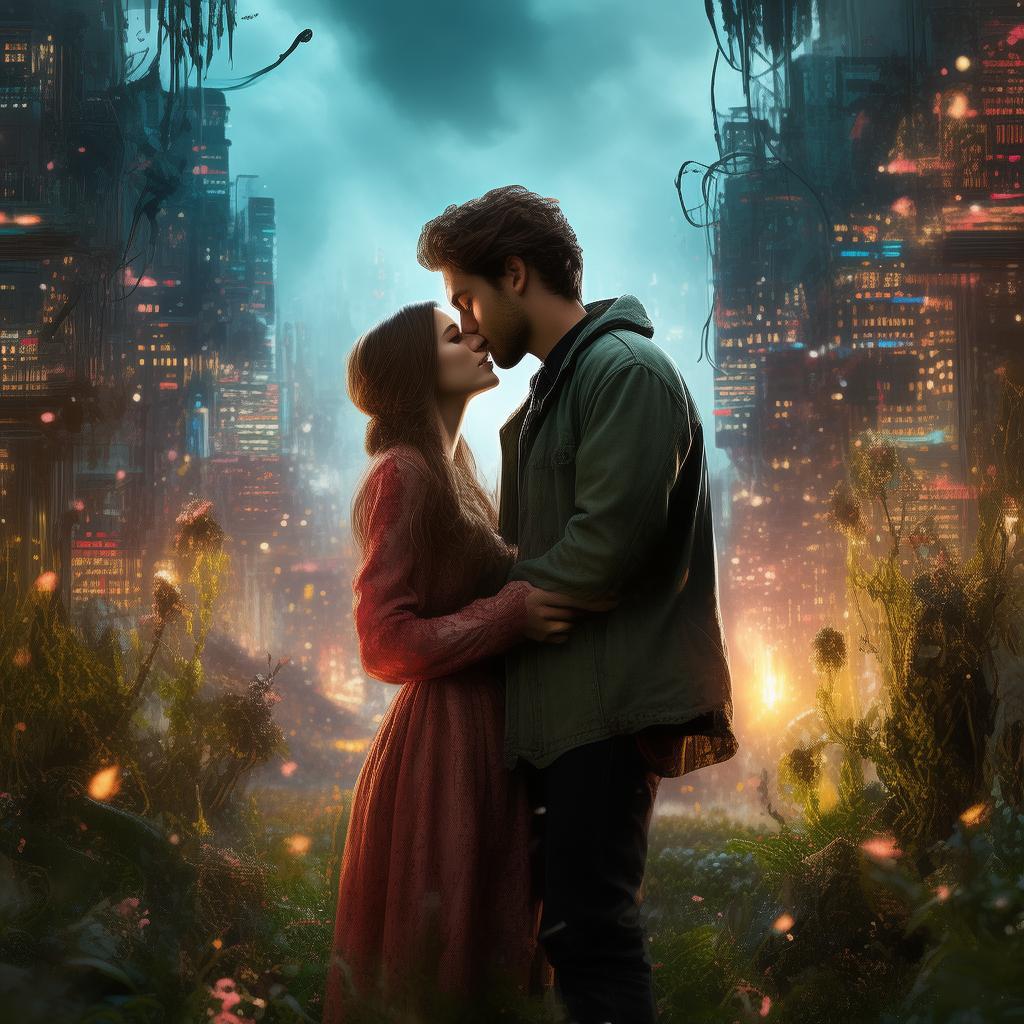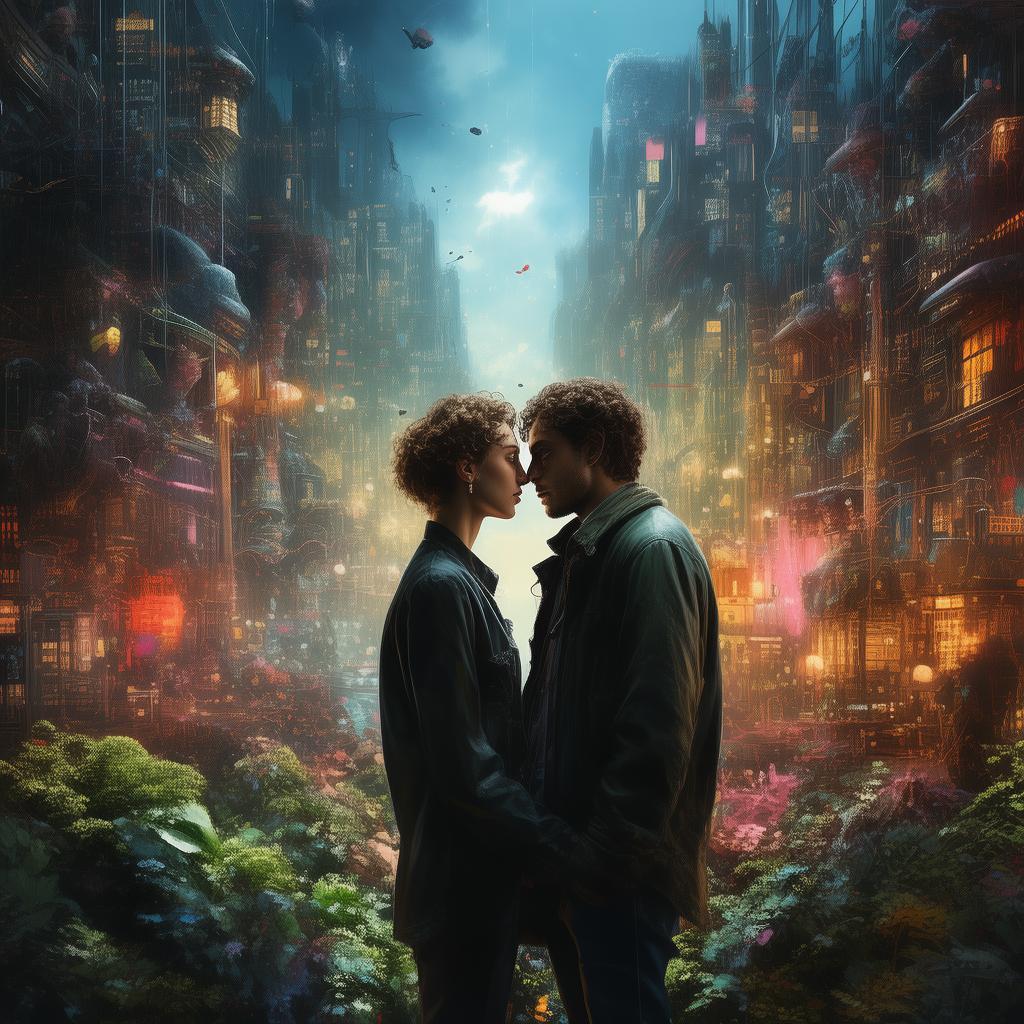Whispers of the Sitar: A Ghazal-Inspired Romance
In the bustling city of Mumbai, the vibrant campus of the National Institute of Music was a symphony of dreams and ambitions. Among the young and the talented, two souls were about to embark on a journey that would forever change their lives. She was Aria, a young American woman with a heart for music and a love for the West's classical sounds. He was Rohan, a charismatic and gifted singer from a lineage of Indian classical musicians, whose voice was as enchanting as the ghazals he sang.
The moment Aria stepped into the music department, she was captivated by Rohan's presence. He was unlike anyone she had ever met—his deep-set eyes, his dark hair that seemed to whisper secrets of the East, and his voice that could make the stones in the courtyard of the music school hum with emotion. As days turned into weeks, Aria found herself drawn to Rohan's classes, to the melodies that seemed to carry a story of their own, and, ultimately, to him.
Rohan was intrigued by Aria's Western influence in music. Her love for jazz and blues, her ability to mix traditional Western scales with the complex rhythms of Indian music, fascinated him. They spent countless hours in the music room, exploring each other's worlds, their voices intertwining in a harmonious dance.
But as their relationship deepened, Aria began to realize that her feelings for Rohan were more than just infatuation. She was falling in love with the man, his culture, and the music that was so much a part of his identity. Meanwhile, Rohan felt the pull of his family's expectations. He was expected to carry on the legacy of his ancestors, to perform ghazals at weddings, and to adhere to the customs that had been passed down through generations.
The third character in their story was Aisha, Rohan's younger sister, a woman who was equally talented in her own right. Aisha's music was a blend of traditional Indian instruments and modern pop, and she had a voice that could move mountains. She was also the one who first introduced Rohan to Aria, recognizing the spark between them.
One evening, as they sat in the music room, Aria and Rohan played a duet that was a fusion of Western and Indian music. The result was breathtaking, but it also brought up a question that hung heavily in the air: Could their love transcend the boundaries of culture and tradition?
The following week, Rohan's family hosted a grand wedding at their ancestral home, and he was expected to perform a ghazal at the reception. Aria, feeling the weight of her own cultural identity, decided to attend, not as Rohan's girlfriend, but as a guest, determined to see her love for him in the context of his life.
The night of the wedding was a blur of colors, sounds, and emotions. Rohan's performance was as mesmerizing as always, but the music seemed to carry an undercurrent of something else. It was then that Aria saw the conflict in Rohan's eyes, a battle between his heart and his duty to his family.
The next day, Aria found herself in a conversation with Aisha, who seemed to understand the turmoil in Rohan's heart. Aisha confided that she had always dreamed of breaking free from the constraints of her culture, to create her own music, her own path.
That night, Aria approached Rohan in the music room, where they first found solace. She looked into his eyes and said, "Rohan, I love you. I love you more than the music we create together, more than the ghazals you sing. But I also love the Indian culture you come from. Can we find a way to blend our lives, our music, and our love?"
Rohan sighed, his eyes filled with a mix of fear and hope. "Aria, I am torn. I love you, but my family... my heritage..."

Aria took his hand, her voice filled with determination. "Then let us create a new tradition, one that respects both our backgrounds. Let us blend the East with the West, and let our love be the bridge."
As they spoke, the music room seemed to fill with the sound of a new melody, one that was as unique as their love story. Rohan smiled, and Aria knew that together, they could face anything, including the expectations of their families and cultures.
In the days that followed, Rohan and Aria worked tirelessly to create a performance that would showcase their love for each other and for the music that connected them. They called it "Whispers of the Sitar," a fusion of Western and Indian sounds, a testament to their love and to their belief in the power of music to heal and to bridge cultural divides.
The performance was a success, not just for the music, but for the love story that had unfolded behind it. Rohan's family, though initially skeptical, eventually embraced Aria as part of their own, recognizing the beauty of their union and the music that it had brought into their lives.
Aria and Rohan stood on the stage, bathed in the warm glow of the evening sun, their music echoing through the crowd. They had proven that love, in all its forms, was a universal language that could transcend borders, cultures, and generations.
And so, their story continued, a testament to the power of music, love, and the courage to embrace one's own identity while finding a place for another.
✨ Original Statement ✨
All articles published on this website (including but not limited to text, images, videos, and other content) are original or authorized for reposting and are protected by relevant laws. Without the explicit written permission of this website, no individual or organization may copy, modify, repost, or use the content for commercial purposes.
If you need to quote or cooperate, please contact this site for authorization. We reserve the right to pursue legal responsibility for any unauthorized use.
Hereby declared.









